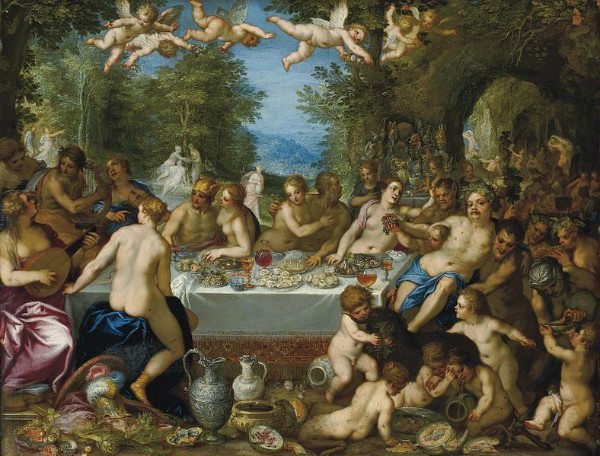Contents
ToggleIn short
The Anthesteries (Ἀνθεστήρια), are a festival at the end of winter and a feast of the dead celebrated in the Greece ancient in honor of the god Dionysus. They take place at the time of resurgent vegetation, from the eleventh to the thirteenth day of the month Anthesterion, eighth month of the Attic calendar, last month of the year before March 1 beginning the new year and the period of war.

Anthesteries, feast of the dead in honor of Dionysus
The first day is called Πιθοίγια / Pithoígia, meaning “the opening of the jars”. The Athenians go near the sanctuary of Dionysus “in the marshes” (Dionysus Limnaios) to open the jars crowned with flowers which contain the new wine, fruit of the previous harvest.
Along the way, the revelers, perched on rustic carts, make jokes and mockery at passers-by. After a solemn offering to the god, everyone can taste the new wine.
The second day is called Χόες / Khóes, that is to say “the festival of the pitchers”. It always takes place at the god's sanctuary, the Limnaion. Pitchers of new wine are served and a drinking competition is organized, as Aristophanes relates in The Acharnians: at the signal of a trumpet, it is the one who will empty a jug of wine of a little more than three liters. We witness with great jubilation the arrival of Dionysus on a naval chariot.
The sanctuary of Dionysus in the marshes is then open for the one and only time of the year, and all the other temples are closed; the hierogamy (sacred union) of the wife of the archon-king and Dionysus is organized there: fourteen women of good birth, described as γεραραί in Greek, assist the wife of the archon-king and perform the rites on as many altars. In this hierogamy an ancient rite of alliance with the forces of life was performed. Apotropaic means are used to protect against evil influences, because as soon as the sun sets, the dead come back to haunt the living.
The third day is called Χύτροι / Khýtroi, that is to say “the festival of pots”. Pots of seeds are cooked in each house for the dead. Because this last day is dedicated to the worship of the dead. The souls of the dead return on this day. We pray for the dying. Hermes Psychopompes, conductor of souls, receives offerings of seed porridge (in Greek παγκαρπία) which should not be consumed.
The hydrophoria ceremony consists of offering the dead libations of water, poured into excavations. At the end of the celebration, the dead are dismissed with this formula: “Go away, Keres, the Anthesteries are over.” It is as if their association with the living lasted during the winter period and ended with it.
All of these ceremonies seem to take place without the ministry of priests.
Social networks
Picture
